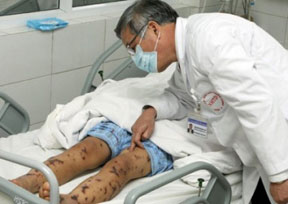
What is meningococcal disease?
Meningococcal disease is a serious bacterial illness. It is a leading cause of bacterial meningitis in children two through 18 years old in the United States. Meningitis is an infection of the covering of the brain and the spinal cord.
Meningococcal disease also causes blood infections.
Anyone can get meningococcal disease. But it is most common in infants less than one year of age and people 16–21. Children with certain medical conditions, such as lack of a spleen, have an increased risk of getting meningococcal disease. College fresh-men living in dorms are also at increased risk.
Meningococcal vaccine
There are two kinds of meningococcal vaccine in the U.S.:
Meningococcal conjugate vaccine (MCV4) was licensed in 2005. It is the preferred vaccine for people two through 55 years of age.
Meningococcal polysaccharide vaccine (MPSV4) has been available since the 1970s. It may be used if MCV4 is not available, and is the only meningococcal vaccine licensed for people older than 55.
Both vaccines work well, and protect about 90 percent of people who get them. MCV4 is expected to give better, longer-lasting protection.
Who should get meningococcal vaccine and when?
A dose of MCV4 are recommended for children and adolescents 11 through 18 years of age.
Meningococcal vaccine is also recommended for other people at increased risk for meningococcal disease:
* College freshmen living in dormitories
* U.S. military recruits.
* Anyone traveling to, or living in, a part of the world where meningococcal disease is common, such as parts of Africa.
* Anyone who has a damaged spleen, or whose spleen has been removed.
* Anyone who has terminal complement component deficiency (an immune system disorder).
MCV4 is the preferred vaccine for people two through 55 years of age in these risk groups. MPSV4 can be used if MCV4 is not available and for adults over 55.
How Many Doses?
People two years of age and older should get one dose.
Sometimes a second dose is recommended for people who remain at high risk. Ask your provider.
MPSV4 may be recommended for children three months to two years of age of under special circumstances. These children should get two doses, three months apart.
Some people should not get meningococcal vaccine or should wait
- Anyone who has ever had a severe (life-threatening) allergic reaction to a previous dose of either meningococcal vaccine should not get another dose.
- Anyone who has a severe (life threatening) allergy to any vaccine component should not get the vaccine. Tell your doctor if you have any severe allergies.
- Anyone who is moderately or severely ill at the time the shot is scheduled should probably wait until they recover. Ask your doctor. People with a mild illness can usually get the vaccine.
- Anyone who has ever had Guillain-Barré Syndrome (GBS) should talk with their provider before getting MCV4.
What are the risks from meningococcal vaccines?
A vaccine, like any medicine, could possibly cause serious problems, such as severe allergic re-actions. The risk of meningococcal vaccine causing serious harm, or death, is extremely small.
* A serious nervous system disorder called GBS has been reported among some people who received MCV4. This happens so rarely that it is currently not possible to tell if the vaccine might be a factor. Even if it is, the risk is very small.
What if there is a moderate or severe reaction?
What should I look for?
· Any unusual condition, such as a high fever, weakness, or behavior changes. Sign of serious allergic reaction, can include difficulty breathing, hoarseness or wheezing, hives, paleness, weakness, a fast heart beat or dizziness.
What should I do?
· Call a doctor, or get the person to a doctor right away.
· Tell your doctor what happened, the date and time it happened, and when the vaccination was given.
· Ask your doctor, nurse, or health department to report the reaction by filing a Vaccine Adverse Event Reporting System (VAERS) form.
Or you can file this report through the VARES web site at www.vaers.hhs.gov, or by calling 1-800-822-7967.
VAERS is only for reporting reactions. They do not give medical advice.
The National Vaccine Injury Compensation Program
A federal program exists to help pay for the care of anyone who has had a rare serious reaction to a vaccine.
For information about the National Vaccine Injury Compensation Program (1-800-338-2382 or visit their website at www.hrsa.gov/vaccinecompensation.
How can I learn more?
· Contact the Centers for Disease Control and Prevention (CDC);
· Call 1-800-232-4636 (1-800-CDC-INFO)
· Visit CDC’s National Immunization Program website at www.cdc.gov/vaccines
· Visit CDC’s meningococcal disease website at www.cdc.gov/ncidod/dbmd/diseaseinfo/meningococcal_g.htm
· Visit CDC’s Travelers’ Health website at wwwn.cdc.gov/travel


Be the first to comment